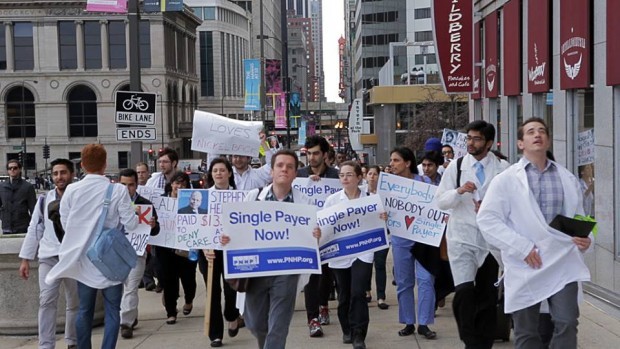Our goal can be easily guessed by our name: “Students for a National Health Program.” We are a group of students who believe the United States should implement a national, universal, single-payer health care system. Whatever you’d like to call it, such a system would entail that all citizens of the United States essentially pay into a national health insurance program for all other citizens. Everyone would chip in, nobody can opt out, and everyone gets covered for nonelective health care. Several other developed nations have successfully implemented such a health care system, Canada and the United Kingdom being perhaps the most representative countries. Our goal is simple, and we know based on the example of other countries, that our goal will also work.
So, of course, the more difficult question is, how do we get there? Based on what I have seen so far in the single-payer movement, we’ve been employing the following “classic” approaches: reaching out to physicians, medical students, medical residents, and public health professionals in an attempt to educate and enlighten them on the pros and cons of our current capitalist health care system versus a national (some would even say “socialist”) one. Of course, these are good, tried and true approaches, and the single-payer movement would certainly fail without them.
However, I’d like to propose an additional focus for our efforts: reaching out to and standing in solidarity with organized labor – that is, workers organized in labor unions.

First, what is a worker? There are two answers to this question, each a different representation of the same. One such representation is the worker as an individual: a person who goes to a workplace, expends his or her labor in exchange for a wage (often set by his employer), and then uses that same wage to buy goods and services (produced by other workers) he or she needs to sustain himself or herself. These goods and services include, but are not limited to, food, clothing, hygiene, and of course, health care.
However, a worker can also be thought of as a tool for producing value. This is the second representation, which manifests in two ways. One way is the value inherent in the goods or services he produces: a haircut, repairing an appliance, production of a car, or the harvesting of fruit, for example. A second way this representation is manifested is in the value of profit he produces for his employer. This representation is often talked about in the conversation about sweatshops: a pair of sneakers may only cost a few dollars to produce, but sells for a few hundred. The difference between what it costs to produce an item and what the item can sell for, is then collected by the business owner as a profit. So, we see that labor creates all value, the value needed to maintain society, as well as keep the business owners alive.
So, why is it important to understand those two representations of the worker in the context of health care? We must first recognize and accept, and not unreasonably so, that the worker as an individual with human needs has an interest in having access to quality affordable health care.
However, we must also recognize that the worker as a tool for producing profit for his employer is in a position where he or she can effectively make demands about his or her health care, especially when organized with enough coworkers. We’ve seen this happen quite commonly already, with labor unions threatening to stop work if, say, the employer doesn’t agree to offer more comprehensive health insurance coverage. Organized, concerted stoppage of work has historically proven an effective tactic for winning demands whether it be more pay, less hours, or better health care, because it reminds the business owner that the business cannot survive without its employees running the show.
But suppose the health care demand was different than what I had mentioned above. What if the demand were for a single-payer health care system, or at the very least, an official endorsement for such?
Let us first examine hospital corporations, businesses which we all know have a tremendous influence on our health care system through astronomical amounts of money used to sway politicians. At first thought, and not an entirely unreasonable one, it might seem as though there is no way we can fight these businesses and make our voices heard. “There will always be money in politics,” many say.
However, we must remind ourselves where this money, this value and this power comes from. It comes from the hands, hearts, and minds of people who work for these very businesses – physicians and nurses, of course, but also the lab technicians, receptionists, food servicers, maintenance workers, and janitors. Without these people, our hospitals could not operate, and our patients lives would be endangered. Yet, far too often, these very essential workers are the same people who lack adequate access to quality health care, who don’t make enough money to be able to afford medications, and who are at greatest risk for becoming bankrupt from medical bills.
These workers may seem powerless; they may seem to be under complete control of the businesses they work for. Most of the time, this holds true. In the health care industry, nurses are being forced to work with an unsafe ratio of patients to nurses, technicians work unpredictable schedules (a night shift one day following by a morning shift the next, for example), and unskilled laborers such as janitorial and maintenance workers earn barely enough to make ends meet. Workers are powerless when they accept the control of their employers, when they experience and subsequently believe that it’s just the way things are, when they are told to work harder for the greater good of everyone involved in the business.
But it doesn’t have to be this way. People don’t have to accept being treated as simply tools for producing value, as they are being treated now by hospital corporations. They can demand to be treated as human beings with human needs. Workers of the health care industry can stand together and put pressure on their employers by threatening to stop work unless they receive a pay increase, more regular hours, better staffing, or (more congruent with our goals) the employer officially supports a single-payer health care system. Workers will only do this, however, if they too believe such a system will benefit them.
The possibility of an educated and organized workforce effectively using its position to collectively demand a single-payer health care system is exactly why we as Students for a National Health Program need to stand with the labor movement. We need them just as much as they need us. Although our aim as an organization is largely legislative, helping to agitate, educate, and organize the working class has numerous benefits. It would make the fight for single-payer more inclusive of people from all walks of life. The demand for an improved health care system must come from everyone. It’s not just a movement of health care professionals, because in the end it doesn’t affect just us. It is our duty, therefore, to reach out to workers of all industries, give them the information we have, and hope they join us.
Furthermore, a stronger labor movement will also result in a stronger singlepayer movement, by allowing us to cut into the profits of businesses that currently have too strong an influence in our nation’s capital. And this doesn’t have to, nor should it come from only the health care industry. All workers of all industries would benefit from a single-payer system. There would be guaranteed coverage and lowered health care costs for all workers, therefore all workers deserve the opportunity to participate in the demand for better health care.
Of course, this is much easier said than done (which is probably why we haven’t done it yet). To organize the working class and win demands is no small task, and although I don’t have a solution or guideline, I do have some suggestions. We can reach out and get to know the unions in our areas and learn about what they’re doing. Find out what their struggles are, develop relationships with workers and union organizers. Invite workers or union organizers to speak at your school, or even attend talks given by other guest speakers.
Solidarity with the labor movement will help us towards a more just society. It is not only important to keep in mind what we want, but why we want it, and I’d like to think that everyone advocating for a single-payer system is doing so because they want to build a better tomorrow. Perhaps just as important as an improved health care infrastructure are a living wage, safer working conditions, harassment-free workplaces, and paid sick days when it comes to the health of our people and society.
Peeraya Sawangkum is a medical student at the University of South Florida Morsani College of Medicine.
